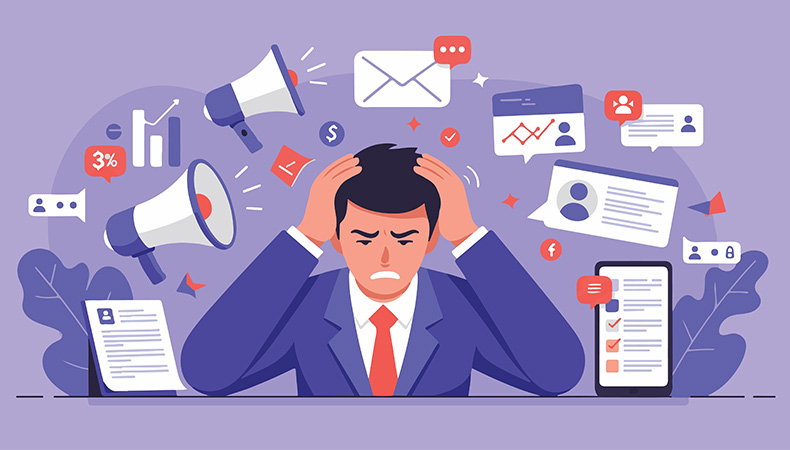How personal risk factors aid workplace stress recognition
Experiencing stress in the workplace can impact productivity and motivation. It can also spill into life outside of work, affecting sleep, relationships and overall wellbeing.
A recent survey into the causes of stress found that one in nine (11%) UK adults feel some level of stress every day, and one in four feel stressed more days a month than they don’t. Of these, nearly a third (30%) said that work in general makes them feel stressed, and over a quarter (28%) pointed to workload demands as a key cause.
Workplace stress can stem from high workloads, deadline pressures, or issues with colleagues. It can also be influenced by pay, holiday policies and flexibility. Even those who enjoy their jobs can find it stressful at times.
Work can easily spill over into personal time, making it difficult to switch off at the end of the day. While hybrid working has its advantages, it can also blur boundaries, making it harder to fully disconnect and leading to longer hours.
Stress, burnout and anxiety
Too much stress can cause anxiety and poor health. We are not robots, and the body has a finite capacity for maintaining this state.
When we reach that limit, there can be a sudden 'fall off the cliff' or 'nosedive' into burnout. While some levels of stress are manageable, it’s important to recognise the signs when it’s becoming too much, both in ourselves and others.
We can all recall times when we’ve felt stressed. Typically, this might manifest through physical or psychological symptoms such as a faster heart rate, quicker breathing, sweaty palms, or feeling on edge and unable to relax.
These responses come from the body’s release of adrenaline, helping us focus, stay alert and maximise energy during short bursts of pressure: the classic ‘fight or flight’ reaction.
However, a heightened state of stress over a long period either a single ongoing situation or repeated stressful events can cause the body to reset chemically. When this happens, the body produces higher levels of cortisol, leading to more sustained problems.
There are physical signs when this occurs: intense fatigue, loss of libido, hair loss, and headaches, to name a few. Cognitive function can also suffer, with memory lapses, poor concentration, negative thinking and indecision.
Prolonged stress may lead to poor sleep, changes in appetite, self-neglect, or turning to alcohol, drugs or smoking. Over time, this can lead to a loss of confidence, anxiety, depression, and a sense of being overwhelmed.
Chronic stress can eventually lead to the distressing and sometimes incapacitating state of ‘burnout’. This is when you no longer have the capacity to care or engage. You may experience feelings of exhaustion, mental distance from your job, or growing cynicism and negativity towards work - often resulting in reduced efficiency.
Burnout rarely happens overnight; it’s usually a gradual process. That’s why it’s so important for managers and colleagues to recognise the signs and offer help or alert someone who can.
Stress as a motivator
In the right amounts, stress can motivate us, increase energy and sharpen focus. It can help us meet daily challenges, both at work and in life, and drive us towards our goals ultimately helping us grow stronger and more resilient. In fact, too little stress can lead to boredom and a lack of purpose.
Sometimes, stress is positive. That burst of adrenaline can push us to achieve great things. Setting manageable goals and working towards milestones can bring a healthy level of pressure that keeps us engaged and excited.
Pressures of life and work
Stress doesn’t usually come from the workplace in isolation; it often stems from a mix of work pressures and personal demands. Social expectations can add to this pressure, making it difficult to keep up.
Modern life is busier and more fast-paced than ever, and we are simply not built for constant stimulation. Factors such as social media and the comparisons it encourages along with the 24-hour stream of information and the culture of presenteeism, all contribute to rising stress levels. Being aware of these triggers and taking steps to mitigate them is essential.
Supporting individuals and promoting wellbeing
Strategies for managing excess stress and burnout include attention to diet, exercise, and mindfulness, but businesses also have a crucial role to play. Employers can promote work-life balance through flexible hours, remote work options, encouraging annual leave and volunteering days.
Fostering a positive, inclusive culture that encourages open communication and regular feedback helps employees feel valued and respected.
Providing wellbeing programmes and taking proactive steps to support physical and mental health pays dividends. Mental health awareness training, counselling services, and employee assistance programmes offer employees impartial support and practical tools to manage stress.
Giving employees access to information and resources, from exercise and sleep to nutrition and lifestyle habits can make a real difference.
When employees feel supported, they are healthier, more loyal and, ultimately, more productive. A workplace that prioritises wellbeing not only supports its people but also strengthens its overall performance.
Supplied by REBA Associate Member, HCML
HCML is a health and wellbeing provider, offering integrated and personalised healthcare solutions.








